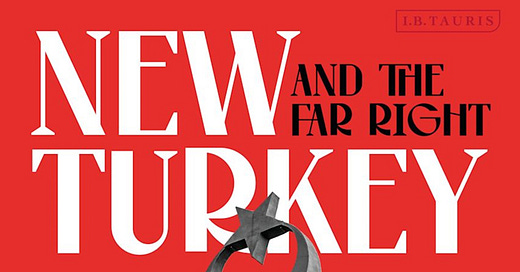Selim Koru on Turkey’s role in the emerging anti-liberal world order
Selim Koru on "New Turkey and the Far Right: How Reactionary Nationalism Remade a Country" (IB Tauris/Bloomsbury)
Listen to Turkey Book Talk: Apple Podcasts / Spotify / PodBean / Stitcher / PlayerFM / Listen Notes
Your designation of the Erdogan government as "far right" might raise some eyebrows. What makes that an accurate description of the Erdogan tradition?
People tend to think about Erdogan as the Turkish version of Viktor Orban in Hungary, Trump in the United States, Narendra Modi in India, or Putin in Russia. These are all people in the far-right traditions of their countries. But when English-language academic literature and journalists look at Turkey, they tend to designate the Turkist tradition, the pan-Turkic tradition, as far-right and Islamists as kind of center-right. When the AK Party came to power they had this period of liberalisation in which they were convincingly able to put themselves into the center-right category, and that never really went away. Therefore when people write about Turkey these days, they write about Erdogan and his movement as a center-right movement. There are many problems with that.
In the 1980s and 90s there were center-right movements and far-right movements. I took this designation from Ilker Ayturk and Tanil Bora. The center-right saw questions of identity as secondary and focused on economic questions. The idea was very much that society has inherent inequalities that you have to work alongside: Men have more power than women, bosses have more power than workers, Turks have more power than Kurds. These kind of things are taken for granted; you don't really emphasise them too much in your politics. Instead, you emphasise economic development. In contrast, the far-right movements said "no, let's emphasise those things". It becomes a special of kind of civilisational revival when you take that into politics. The pan-Turkish tradition is very much like that, and the Islamist tradition is very much like that. Without a doubt, Erdogan very strongly was in the Islamist tradition. He was also, when you look at his early speeches and his early activity, very recognisably a far-right leader. That shifted in the 2000s and it kind of stuck. So part of what I wanted to do with the book was to take things back to the original designation that we used to have.
Turkey has accepted millions of Syrian refugees in recent years. Doesn't that complicate the "far right" description?
It does complicate it a little bit, but I think it still stands. How do we designate what is far right and what is center right? In the European example, there are some who say "European civilisation comes first" and conduct politics based first and foremost on emphasising European civilisation, which can have some dimension of scientific racism about it. That manifests itself in a very anti-immigrant way because there are a lot of migrants who obviously don't come from European backgrounds. Therefore anti-immigration sentiment and some form of racism becomes part of far-right political movements.
But when you apply the same standard to Turkey, it can play out in different ways. On the one hand, there are European-style far-right movements in Turkey. There are people, and they usually come from Turkish backgrounds, who have this vague notion of Turkey being a European nation state and Turkishness being a form of whiteness. And they campaign very strongly against Turkey accepting refugees or allowing migrants to come in. Those are European-style far-right movements in Turkey. But that's not the main far-right movement in the country. The main far-right movements are Islamism and a different version of Turkism, a sort of Central Asian Turkism. In their collective imagination, Turkey is not very European so the influx of non-European migrants doesn't really disrupt the civilisational core of the country. It even enhances it to some extent. If you're a civilisational thinker in France or the United States, for example, you're not really against other white people coming into your country. That has historically been the case. When European migrants came into European countries, it wasn't all that big a deal; when the United States was expanding and lots of Irish migrants and Italian migrants were coming in, it wasn't a huge problem for the American right. In a similar way in Turkey, the presence of non-Turkish Muslims, especially if they're Arab or from neighboring countries, isn't a big problem for the brand of far right that currently rules the country.
Keep reading with a 7-day free trial
Subscribe to Turkey Book Talk to keep reading this post and get 7 days of free access to the full post archives.




